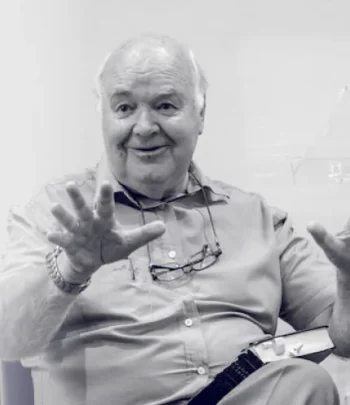John Lennox once received a stern ultimatum from Nobel Prize-winning physicist Stephen Weinberg: “If you want a career in science, you must give up this childish faith in God,” Weinberg said. “If you do not, then it will cripple you intellectually, and you will suffer by comparison with your peers. You simply will not make it.”
Lennox remained steadfast. Without abandoning his faith in God, he went on to become a renowned scientist and mathematician at Oxford. A brilliant debater against the likes of Richard Dawkins and Christopher Hitchens, Lennox stands as a testament to the compatibility of science and faith.
Born in 1943 in Northern Ireland, Lennox excelled in academics, earning doctorates from both Oxford and Cambridge. He specialized in algebraic group theory and became a professor at Oxford University, publishing 70 peer-reviewed articles on mathematics and co-authoring several Oxford mathematical monographs.
Unlike many intellectuals, Lennox retained his faith. His debates against prominent atheists and his numerous books, including his contributions to the film “God’s Not Dead,” present compelling arguments for the coexistence of science and belief in God.
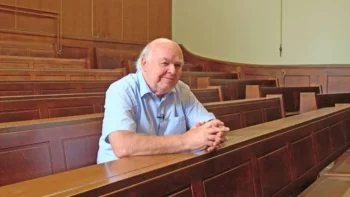 “Far from science having buried God, not only do the results of science point towards His existence, but the scientific enterprise itself is validated by His existence,” Lennox asserts. “Either human intelligence ultimately owes its origin to mindless matter, or there is a Creator. It is strange that some people claim it is their intelligence that leads them to prefer the first to the second.”
“Far from science having buried God, not only do the results of science point towards His existence, but the scientific enterprise itself is validated by His existence,” Lennox asserts. “Either human intelligence ultimately owes its origin to mindless matter, or there is a Creator. It is strange that some people claim it is their intelligence that leads them to prefer the first to the second.”
In addition to English, Lennox speaks fluent Russian, French, Spanish, and German, which he learned to communicate with people from different backgrounds. Once in communist East Germany, he stayed with a family where a 13-year-old girl, despite having the highest marks in her class, was banned from further studies because she refused to swear allegiance to the atheistic state. “I won’t do it,” she said.
“Then you’ll have to work in the slipper factory,” her teacher had told her.
“I stood and wept with her,” Lennox recounts. “I call that intellectual murder. I get alarmed when I see in our Western Free World the stealthy but sure indication of another totalitarianism of the mind that doesn’t really allow people to think.”
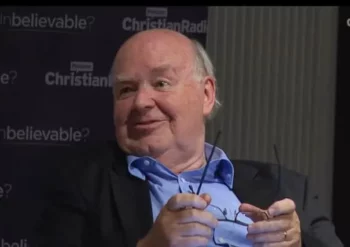 After his visit to East Germany, Lennox was invited to teach mathematics in Soviet Russia. Though he had translated Russian mathematical papers, he could only read and write Russian, not speak it fluently, so he had to quickly learn the language.
After his visit to East Germany, Lennox was invited to teach mathematics in Soviet Russia. Though he had translated Russian mathematical papers, he could only read and write Russian, not speak it fluently, so he had to quickly learn the language.
Lecturing on subnormal algebraic groups in Siberia, he found the Russian mathematicians were keenly interested in his faith. “We hear you believe in God. Why?” they asked.
Lennox relished these opportunities to discuss his faith behind the Iron Curtain, where discussing God was practically forbidden. “Hour after hour, every time I gave a math lecture, those were the questions they wanted answered,” Lennox says. “What did they all want to talk about? God.”
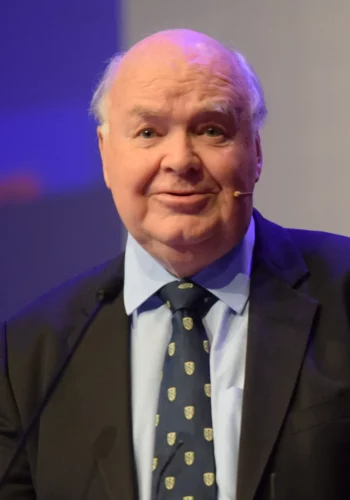 The devaluation of human beings and the failed attempt to construct a new man led to a renewed interest in God among these intellectuals. “We thought we could get rid of God and retain the value of the human being, but we discovered we couldn’t,” a distinguished professor of mathematics explained. “There is no rational justification for behavior if there isn’t a god. We experience it massively.”
The devaluation of human beings and the failed attempt to construct a new man led to a renewed interest in God among these intellectuals. “We thought we could get rid of God and retain the value of the human being, but we discovered we couldn’t,” a distinguished professor of mathematics explained. “There is no rational justification for behavior if there isn’t a god. We experience it massively.”
“How was it possible for me, a mathematician, to believe in God? Because for them, they had an axiom, an unquestioned postulate that there was no god.”
Lennox’s mathematical expertise provided him the platform to talk about his faith. His respected position in the scientific community opened doors for discussions about God throughout the Soviet Bloc.
Raised in Armagh, Northern Ireland, during a time of sectarian religious violence, Lennox learned the value of human dignity from his father, who hired employees regardless of their religious background, even when it made them a target. “Look, as far as I’m concerned, all men and women, irrespective of what they believe, are made in the image of God and therefore are valuable,” his father told him. “I’m going to treat them like that.”
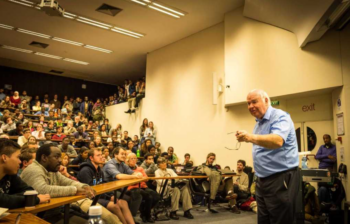 “That was a very profound lesson for me,” Lennox told Brad Cooper on Purpose Nation. “I’ve tried as best I can to put it into practice so that I want to enter into debates, say with perhaps very hostile opponents, but respect them as human beings.”
“That was a very profound lesson for me,” Lennox told Brad Cooper on Purpose Nation. “I’ve tried as best I can to put it into practice so that I want to enter into debates, say with perhaps very hostile opponents, but respect them as human beings.”
Lennox earned a doctorate in philosophy from Cambridge University and a Doctor of Science in mathematics from Cardiff University, ultimately becoming a professor at Oxford University. Since 2007, Lennox has been a prominent opponent of the New Atheists, who claim that science without religion will usher in a golden age of human advancement.
His books, including God’s Undertaker: Has Science Buried God? (2009), God and Stephen Hawking: Whose Design Is It Anyway? (2011), Gunning for God: A Critique of the New Atheism (2011), and Can Science Explain Everything? (2019), challenge this perspective.
“Faith is not a leap in the dark; it’s the exact opposite,” Lennox says. “It’s a commitment based on evidence… It is irrational to reduce all faith to blind faith and then subject it to ridicule. That provides a very anti-intellectual and convenient way of avoiding intelligent discussion.”
If you want to know more about a personal relationship with God, go here
About the writer of this article: Owen Toomey lives in Los Angeles and studies at the Lighthouse Christian Academy.

